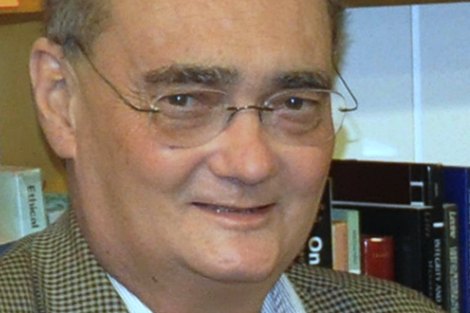Keywords: Australian Institute Of Health And Welfare
-

AUSTRALIA
- Frank Brennan
- 30 May 2016
5 Comments
'Being in the middle of an election campaign, I will not be making any partisan party political points. However being here in the bellwether seat of Eden-Monaro, I will conclude with a critique of both major political parties, and with one piece of political advice for citizens of goodwill seeking a national asylum policy more in harmony with the ideals set out by our bishops in their social justice statement.' Yass Catholic Parish Potluck Dinner, 28 May 2016
READ MORE
-

AUSTRALIA
- Frank Brennan
- 15 April 2016
21 Comments
The royal commission into Aboriginal deaths in custody, which signed off on its final reports 25 years ago this Friday, definitely improved the systems for supervision of persons in detention, reducing the risk of deaths in custody. It also led to better coronial procedures. But it failed to reverse Indigenous imprisonment rates and it did little to counter the underlying causes of Indigenous imprisonment. Back then, Patrick Dodson saw police as the main problem. Now, he thinks it's the legislators.
READ MORE 
-

AUSTRALIA
- Kate Galloway
- 24 February 2016
4 Comments
It is right and good that the outpouring of community and professional goodwill has at least delayed the return of baby Asha to what are reported to be the terrible conditions of the detention centre on Nauru. But Australia's asylum seeker laws involve unresolved systemic issues that such wins cannot by themselves resolve. Widespread community focus on individual cases such as that of baby Asha may in fact prevent action on the deeper issues from gaining traction.
READ MORE 
-

RELIGION
- Frank Brennan
- 27 November 2015
2 Comments
'The crisis of child sexual abuse in our societies has required that our institutional procedures be more transparent and that we learn from the ways of the world in exercising power openly and justly. This means we have to restructure some of our church arrangements so that power is exercised accountably and transparently. All of us who have positions of influence and power in institutional churches need to be attentive to the voices of those who have suffered within our institutions.' 'Discerning the place for the prophetic voice and pragmatic cooperation of the churches in the great moral questions of the age', address to the Association of Practical Theology in Oceania conference, 26 November 2015.
READ MORE
-

AUSTRALIA
- Frank Brennan
- 23 October 2015
4 Comments
Francis knows there are all sorts of issues inside and outside the Church where for too long people with power have tried to keep the lid on, in the hope that the problems and complexities will go away, often by parodying those who see the problems or complexities as small 'l' liberals or cafeteria Catholics. He delights in being joyful and troubled while contemplating big problems, calling people of good will to the table of deliberation reminding them of the kernel of the Christian gospels. He has the faith and hope needed to lift the lid without fear and without knowing the answers prior to the dialogue occurring.
READ MORE
-

AUSTRALIA
- Moira Byrne
- 14 October 2015
3 Comments
Mental health disorders among caregivers occur at a rate of up to two times that of the general population, and relationship breakdown for parents of children with special needs is reported to be around 80 per cent. Since becoming a parent of someone with a disability and changing careers, I've been fortunate to have employers who have permitted part-time work, which has been a crucial aspect of my wellbeing. This has not always been the case, nor is it the case for all caregivers all the time.
READ MORE 
-

- Frank Brennan
- 18 September 2015
Pope Francis's concerns are not narrowly dogmatic or pedagogical but universally pastoral. He knows that millions of people, including erstwhile Catholics, are now suspicious of or not helped by notions of tradition, authority, ritual and community when it comes to their own spiritual growth which is now more individual and eclectic. He wants to step beyond the Church's perceived lack of authenticity and its moral focus on individual matters, more often than not, sexual. He thinks the world is in a mess particularly with the state of the planet — climate change, loss of biodiversity and water shortages, but also with the oppression of the poor whose life basics are not assured by the operation of the free market, and with the clutter and violence of lives which are cheated the opportunity for interior peace. He is going to great pains to demystify his office. He wants all people of good will to emulate him and to be both joyful and troubled as they wrestle with the probl
READ MORE
-

- Frank Brennan
- 01 September 2015
1 Comment
If you want to form government in Australia and if you want to lead the Australian people to be more generous, making more places available for refugees to resettle permanently in Australia, you first have to stop the boats. If you want to restore some equity to the means of choosing only some tens of thousands of refugees per annum for permanent residence in Australia from the tens of millions of people displaced in the world, you need to secure the borders. The untrendy truth is that not all asylum seekers have the right to enter Australia but that those who are in direct flight from persecution whether that be in Sri Lanka or Indonesia do, and that it is possible fairly readily (and even on the high seas) to draw a distinction between those in direct flight and those engaged in secondary movement understandably dissatisfied with the level of protection and the transparency of processing in transit countries such as Malaysia and Indonesia. The popular evil is that political
READ MORE
-

RELIGION
- Zac Alstin
- 13 November 2014
7 Comments
Utilitarian philosopher Peter Singer paid tribute to his friend and intellectual nemesis Nicholas Tonti-Filippini, who died last Friday after suffering pain and discomfort for much of his life. The majority of Tonti-Filippini’s influence on bioethics in Australia took place out of the public spotlight, including has work as chair of a govenment committee on the care of people in an unresponsive or minimally responsive state.
READ MORE 
-

AUSTRALIA
- Frank Brennan
- 22 September 2014
5 Comments
Considering my indebtedness to the two Aborigines who met [my family's ship arriving in Hervey Bay from Ireland] 151 years ago, I owe it to all my fellow Australians to agitate these issues of law, morality and politics here in Ireland so that back in Australia, the homeland which, in my religious tradition, was known as the Great South Land of the Holy Spirit.
READ MORE
-

ENVIRONMENT
- Neil Ormerod
- 06 June 2014
13 Comments
During Abbott's forthcoming visit to Obama he will find a president not only willing to take strong action in relation to climate change, but doing so with the public support of the US Catholic bishops. This is not a situation he will find comfortable given that in the Australian context he has always previously been able to count on the support of Cardinal Pell to muddy the waters on climate change.
READ MORE 
-

AUSTRALIA
I was 13 when he went to Vietnam. There was a kind of perverse status to be derived from having a brother called up for national service, and for him to head north of the equator was a further plus. When I participated in a Moratorium March it remained my secret. What did he see over there? What did he manage to forget over his subsequent 34 years? We'll never know because he never said. And he never participated in Anzac Day.
READ MORE 